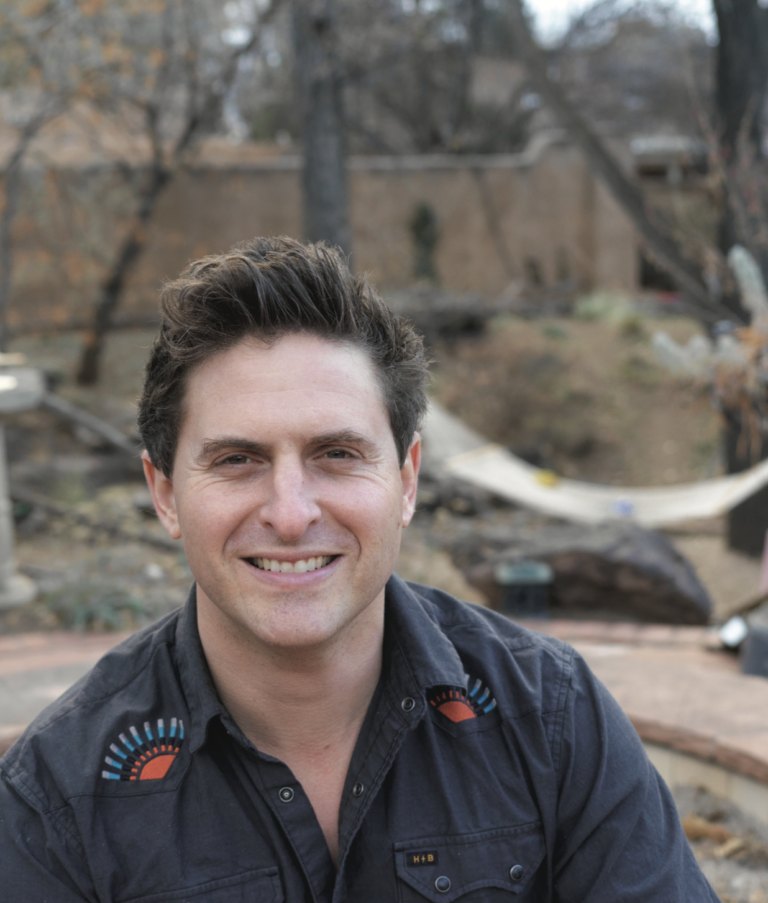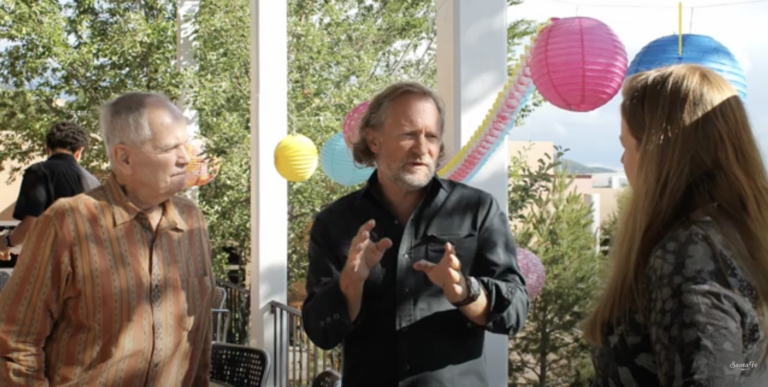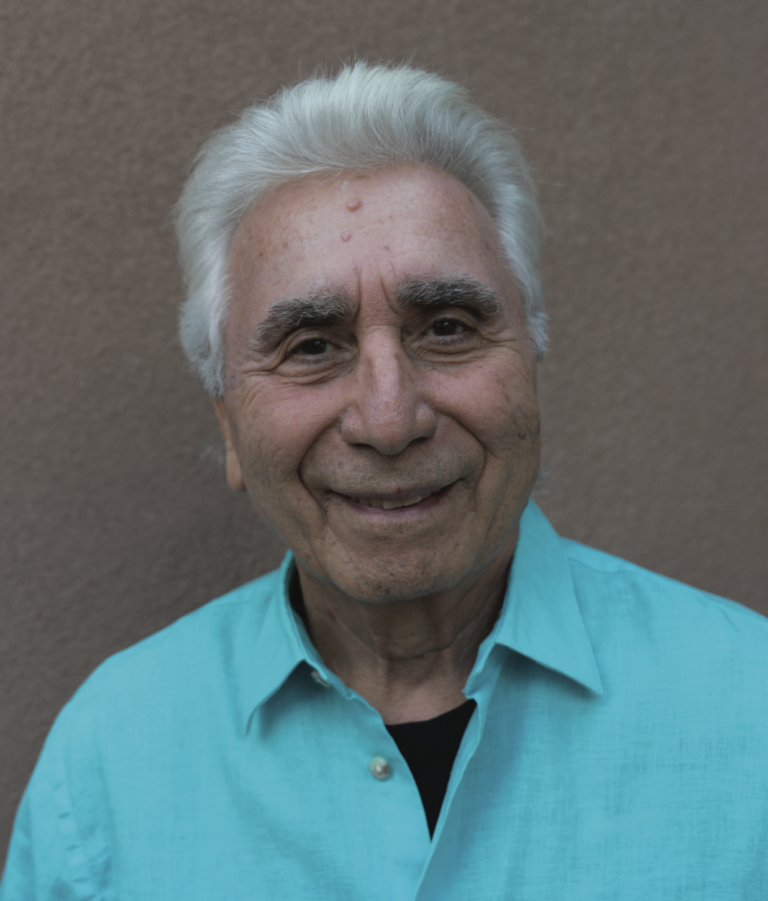I ASKED SALLY if she agreed that one of her superpowers as a reporter might be her inordinately high hit-rate of getting her interviewees to tell her more than they might intend or even understand.
She laughed. I took that as a yes.
To take full measure of what she has done in her career is to recognize that – in addition to her very honed skills and first-rate curiosity – she has this gift. She employs it as needed: the ability to get people to talk truthfully. And when they don’t, she knows it, and I suspect they know that she knows.
All in a day’s work for our grown-up Nancy Drew.
You worked at the Rio Grande Sun in Española, which led to your career as an investigative journalist.
It was a fluke that I became a reporter and that a spontaneous stopover in Santa Fe would launch me into a 40-year career as an author, journalist, and historian. In 1977, I was 23 and had just been fired from my first journalism job in my hometown of Boulder City, Nevada. When I came through Santa Fe, I was told to check out a little kick-ass newspaper in Española where highly respected Bob Trapp was owner/editor/publisher. He had just fired his crime reporter, and though I told him I had just been fired, he hired me anyway – a total rookie – for $85 a week.
What was it like?
First day, I sat down at my desk with a manual typewriter, a black rotary phone, a Pentax camera, and a steno pad. Very quaint. Right away, I was assigned to cover my first murder scene in northern NM: a woman who had been bludgeoned to death in Dixon. I’d never seen a murder victim before, and I became obsessed with her case. After a few weeks, I told Bob Trapp that I didn’t think
the state police were even trying to solve her case. He told me they rarely solved any murders. I was shocked.
I started digging up all the recent unsolved murders and saw that what most of the murder victims in Rio Arriba County had in common was that they were exceptionally beautiful, young Hispanic women and that cops seemed to be covering up for their killers.
So during the next year, I wrote a number of stories bringing attention to the many unsolved murders, exposing law enforcement’s role in impeding the investigations. I also uncovered an international heroin-trafficking ring operating out of northern NM that was tied to the murder victims. My re-opening of the murder cases resulted in the indictment of police officers and the implication of NM public officials. That did not make me very popular. Several of the murdered women had been drug couriers for the influential politicians and wealthy businessmen in Santa Fe.
Did you stay in New Mexico?
No, my stories received widespread recognition and brought me to the attention of nationally syndicated columnist Jack Anderson, who hired me to join his team of investigative reporters in Washington, DC. That experience served as a graduate school for muckraking where I honed what had become my trade under some of the best reporters of the era. It was during my time working for Anderson that I learned that the higher the stakes in the story, the higher the risks. It was a historic moment in America, with half a dozen congressional committees conducting high-profile investigations into the Kennedy assassination, CIA-sponsored coups, Jimmy Hoffa’s disappearance, Robert Vesco, the French Connection, and on and on. Jack even sent me to the Soviet Union to report on its invasion of Afghanistan at a time when the Soviet government was denying they had sent troops in.
During that visit to the Soviet Union, I went to Moscow, Leningrad, and Kyiv; dissidents talked to me. Of course, they were being told that the Soviet Union hadn’t invaded Afghanistan. Fake propaganda. Just like now! Again, the Soviet Union secretly sent the crematorium body bags of soldiers who weren’t returning. They’re doing that now. And it’s devastating to the people of Ukraine. I’m put off that we can’t help Ukraine. We can’t help any country not in NATO? That will set off more countries trying to get nukes to defend themselves. The Soviet Union fell, and that’s when the US let them down. And another thing, where is Israel? Ukraine has a quarter million Jews.
After the Soviet Union fell, the corruption started. Russian money ended up in the hands of the GOP. Dirty money did not flow into the hands of Democrats.
You seem to have been up against the powers that be your whole life. How do you get your information?
You can’t separate that from who I am: raised in the dark money of Las Vegas, covert operations, the Nevada Test Site, organized crime – my father had a lot of important clients. I was able to see how a lot of things worked, and I saw that there was more going on than just random people being murdered. That helped me see that there were mob connections in Española.
Did your father share that view: covert operations, dark money?
My dad had a great love for Nevada. It was hard to be a square guy in a crooked town. I watched my dad try to navigate as an honest broker in a town where there were so many thugs.
He would represent some mob figures when they got into trouble, but he was never corporate counsel.
He was on the County Commission and was, of course, offered certain things. He ran for Congress twice, and sometimes we struggled financially. I thought maybe he should have taken some of that money offered him, but he was insulted by the unabashed ugliness of capitalism.
You went after Bechtel, one of the most secretive and powerful companies in the world.
Most of these things start, and I have no idea what I’m getting into. The idea came from my publisher. Bechtel had built Hoover Dam, so I grew up knowing that they tamed the Colorado, brought power to the West. I learned that Bechtel was a household name, a huge company with tentacles all over the world, especially in the Middle East. It was a family corporation – five generations and not easy to find documents, but stories are meant to get out. A prominent lawyer in California had filed a major case against Bechtel – thousands of pages – for wrongful termination. It was a gold mine!
That’s where the magic comes in, just like the book I’m doing on the Sinaloa Cartel. I got that tip from a cocktail party in Santa Fe where I talked to someone. Six months later, that person talked to someone in Florida who said she was related to people murdered in Mexico. It was secondhand, third-hand information. And I tracked it all.
Is it persistence? Good luck?
I can tell when there’s a real story. I have a good nose for news, a fierce curiosity, and intrepid tenacity. When I did the story about the disappearance of Melanie Flynn, the playgirl daughter of a prominent Kentucky politician, it resulted in a series of stories tying her disappearance to an international drug-smuggling ring in Kentucky involving high-level public figures.
First, the FBI notified me about death threats. Then rumors started that I was sleeping with my sources, often spread by fellow reporters at the Lexington and Louisville newspapers. The TV station fired me, and I learned through this personal experience that there were parallel methods of silencing reporters and silencing women.
You’ve done great work over time, and you’re suddenly finding yourself having commercial success.
Timing is everything. The Bluegrass Conspiracy was actually the Iran-Contra story. The Money and the Power, which has now been optioned for a scripted series, is about the Trumpian era of organized crime figures. I’m reminded of the maxim I’m an overnight success after forty years!
Isn’t there a disillusionment with reported truth today?
There was a time when good reporting really affected outcome and was respected. When I started, reporters were revered. When I worked for Jack Anderson, it was a time when investigative journalism was considered among the most honorable of professions. It was a great honor to work for him during those glory days of the Pentagon Papers, Watergate, Mai Lai. We passionately believed that independent journalism could bring a corrupt regime to its knees.
What is the theme that connects your books – what is your beat?
I’ve come a long way from the Rio Grande Sun in 40 years. Since 1990, I have published nine books of narrative nonfiction, books that I have come to define as “investigative history.” Though all my books deal with seemingly disparate subjects, they are unified by a central theme of the exploration and exploitation of power. Who has it? How do they wield it? How do they protect it? And how do they respond when it is threatened? And why are women always the expendable ones? Only in recent years did I begin to realize that these were not individual tangential narratives but that I have been chipping away at the edges of one story: the silencing of women.
At the core of nearly every one of my wide-ranging exposés was this question: Who killed this woman and why? By looking at women who were disappearing or being murdered, I have unraveled corrupt power structures in the country. I have spent my life writing the stories of the losers. In my case, many of these “losers” were murdered women whose stories could shed light in corners that were being hidden by powerful men who had a lot to lose by exposure. I learned that in any city, county, or state where I looked at the women who were murdered, their cases led me to the power structure controlling that place.
Learn more at sallydenton.com
Photo Mary Moon








